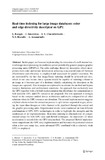| dc.contributor.author | Bampis, Loukas | |
| dc.contributor.author | Iakovidou, Chryssanthi | |
| dc.contributor.author | Chatzichristofis, Savvas A. | |
| dc.contributor.author | Boutalis, Yiannis S. | |
| dc.contributor.author | Amanatiadis, Angelos | |
| dc.date.accessioned | 2017-10-24T10:43:31Z | |
| dc.date.available | 2017-10-24T10:43:31Z | |
| dc.date.issued | 2014 | |
| dc.identifier.issn | 0920-8542 | |
| dc.identifier.uri | http://hdl.handle.net/11728/10144 | |
| dc.description.abstract | In this paper, we focus on implementing the extraction of a well-known low-level image descriptor using the multicore power provided by general-purpose graphic processing units (GPGPUs). The color and edge directivity descriptor, which incorporates both color and texture information achieving a successful trade-off between effectiveness and efficiency, is employed and reassessed for parallel execution. We are motivated by the fact that image/frame indexing should be achieved real time, which in our case means that a system should be capable of indexing a frame or an image as it becomes part of a database (ideally, calculating the descriptor as the images are captured). Two strategies are explored to accelerate the method and bypass resource limitations and architectural constrains. An approach that exclusively uses the GPU together with a hybrid implementation that distributes the computations to both available GPU and CPU resources are proposed. The first approach is strongly based on the compute unified device architecture and excels compared to all other solutions when the GPU resources are abundant. The second implementation suggests a hybrid scheme where the extraction process is split in two sequential stages, allowing the input data (images or video frames) to be pipelined through the central and the graphic processing units. Experimental results were conducted on four different combinations of GPU–CPU technologies in order to highlight the strengths and the weaknesses of all implementations. Real-time indexing is obtained over all computational setups for both GPU-only and Hybrid techniques. An impressive 22 times acceleration is recorded for the GPU-only method. The proposed Hybrid implementation outperforms the GPU-only implementation and becomes the preferred solution when a low-cost setup (i.e., more advanced CPU combined with a relatively weak GPU) is employed. | en_UK |
| dc.language.iso | en | en_UK |
| dc.publisher | Springer | en_UK |
| dc.relation.ispartofseries | The Journal of Supercomputing;Volume 71, Issue 3 | |
| dc.rights | © Springer Science+Business Media New York 2014 | en_UK |
| dc.rights.uri | http://creativecommons.org/licenses/by-nc-nd/4.0/ | en_UK |
| dc.subject | GPU | en_UK |
| dc.subject | Hybrid implementation | en_UK |
| dc.subject | Image retrieval | en_UK |
| dc.subject | Feature extraction | en_UK |
| dc.subject | Database indexing | en_UK |
| dc.title | Real-time indexing for large image databases: color and edge directivity descriptor on GPU | en_UK |
| dc.type | Article | en_UK |
| dc.doi | 10.1007/s11227-014-1343-2 | en_UK |


